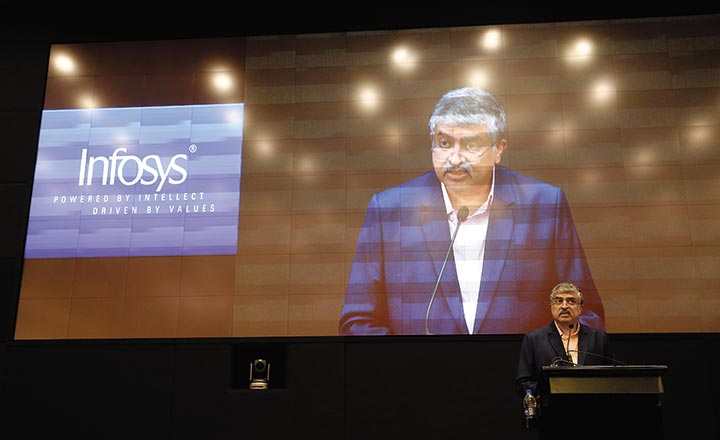In the middle of June three years ago, a media statement from Infosys announced a change of guard. Vishal Sikka, member of the executive board at SAP, would replace SD Shibulal, one of the company’s founders, as MD and CEO. It marked a new era where a professional would, for the first time, occupy the corner office. It was historic in ways more than one. The job on hand for Sikka was simple: bolster growth and margins. While he did manage to deliver on both counts, he is out of Infosys after three eventful years following a series of differences with the promoters, who have been vocal about their concerns on what they termed as serious lapses in corporate governance in the company.
The wheel has come full circle with control back in the hands of the promoters and Nandan Nilekani, back at the helm as the non-executive chairman of the company he co-founded with seven others in 1981. As one of its successful CEOs, Nilekani does inspire a lot of confidence among all the stakeholders and brings the much needed stability as Infosys faces itself in yet another leadership crisis. But the strategic dilemma on the way forward for Infosys remains. Nilekani has indicated that the company will unveil its new strategy in October, which also includes looking for a new CEO and reconstituting the board. The move to a more digital-led model from a traditional services model will take a backseat in the near term as the company is likely to focus more on execution of existing projects well, rather than looking at the future as it gets its house in order.
The silver lining for Sikka was the fact that the company’s performance improved under his tenure. After a lacklustre performance between FY12-15 where Infosys (average revenue growth of 8%) significantly underperformed industry leader TCS (average revenue growth rate of 15%) by a significant margin, the company turned the corner in FY16. Infosys actually managed to outperform TCS on the revenue front with large deals won by the company increasing from around Rs.122,052 crore in FY15 to around Rs.227,812 crore in FY17. Sikka’s tenure saw revenue increase by 28% from Rs.53,319 crore to Rs.68,484 crore. Leaving out the consulting subsidiaries Lodestone and Noah, the others included Skava, Panaya, Kallidus and Edgeverve grew nearly on an average by 44% in FY17 bringing Rs.3,162 crore.
Given the background at SAP, Sikka was expected to focus a lot more on products instead of services. And that’s what he did. He spoke of the need to get it right on areas like artificial intelligence (AI), virtual reality and big data. Another initiative was Nia, a next generation AI platform to help businesses automate complex responses. The zero distance programme, another Sikka initiative, was a call to employees to create innovative solutions beyond the charter of each project and help grow client revenue.
Through his tenure, Sikka attempted to change Infosys’ way of doing business and make it ready for a changing world order. He championed the concept of design thinking, which looks at business problems from a customer perspective and goes through several creative ideas to figure out the right way to develop a solution. Zero Bench was an initiative that encouraged engineers on the bench to pitch innovative ideas that could be implemented in a bid to engage with them better. But with his sudden departure the fate of many of his initiatives hangs in balance.
Eye on the future
Peter Schumacher, president and CEO, Value Leadership Group is clear that the goings-on will impede the effort of the search committee on this issue. “The current development is definitely not a storm in a teacup and the risk is that the next CEO will be a compromise candidate,” he says. The worry, according to him, is that the crisis has distracted the management when the business environment is already tough. “Instead of leaping ahead, Infosys is now at risk of falling behind even further.” Nilekani himself did not hold back at the investor call and said it was necessary “to bring down the noise in the system and just focus on work.”
There is no dispute on the need for damage control. “There is little to doubt that Infosys’ reputation has taken a hit. The company has now lost an important differentiating competitive advantage that has always helped it capture a premium in the market,” says Schumacher.
Peter Bendor-Samuel, founder and CEO of Everest Group, a global management consulting firm, says the board faces a difficult choice, since it will have to move quickly and avoid the cultural issues that it incurred when it appointed Sikka. This logic would have it look internally for candidates. “Alternatively, Infosys faces significant market scepticism from both shareholders and customers, that an internal candidate can drive the change necessary for it to become a leader in the new digital marketplace,” he maintains.
So there is a lot riding on how the new CEO and Nilekani will work together as a team. Nilekani has already indicated that Infosys will be a board-driven company.
At a time when the overall Indian IT industry is struggling on the growth front, Infosys could have well avoided an internal crisis of this magnitude that has all the makings of slowing things down at least in the short term. A combination of aggression and reassuring its customers that it is life as usual will be the way to do it. In short, it’s just time to get back to work.











